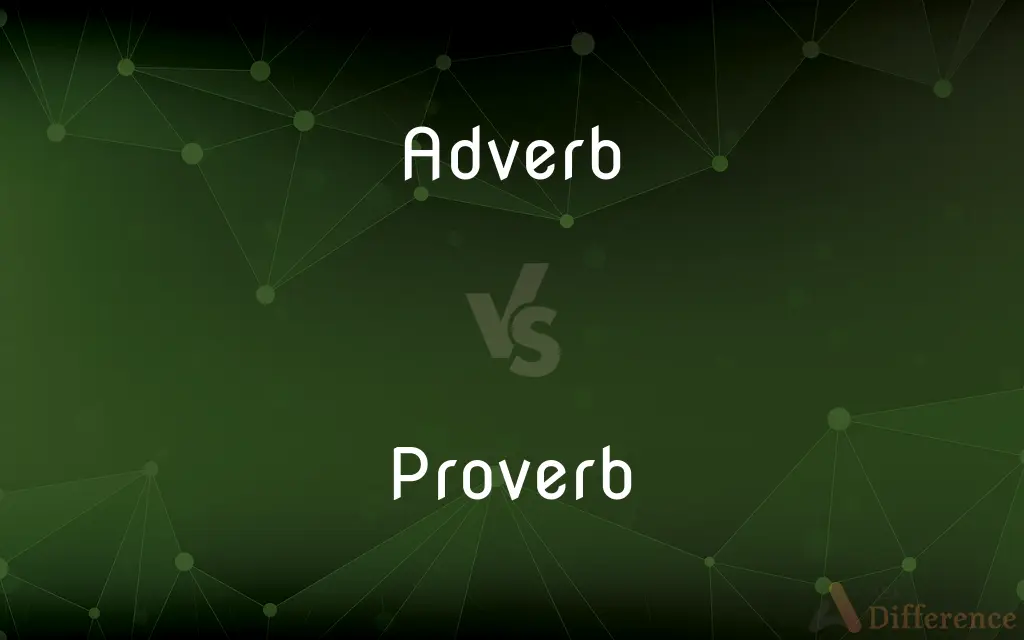Adverb vs. Proverb — What's the Difference?
Edited by Tayyaba Rehman — By Fiza Rafique — Updated on April 30, 2024
An adverb modifies verbs, adjectives, or other adverbs, typically expressing manner, place, time, or degree; a proverb is a short, traditional saying that expresses a truth or piece of advice.

Difference Between Adverb and Proverb
Table of Contents
ADVERTISEMENT
Key Differences
Adverbs are a part of speech used to modify verbs, adjectives, or other adverbs, often clarifying the manner, time, place, or degree of the action or characteristic. Whereas, proverbs are concise traditional sayings that encapsulate morals, wisdom, or truths, often used to guide behavior or illustrate common experiences.
Adverbs can take various forms and can be placed flexibly within a sentence to modify different parts of speech. For example, they can describe how, when, where, and to what extent an action is performed. On the other hand, proverbs are fixed phrases that do not change in structure and are used metaphorically to convey broader life lessons or cultural wisdom.
The use of adverbs is fundamental in adding detail and depth to sentences, enhancing the reader's understanding of how an action is taking place. In contrast, proverbs serve as rhetorical devices that provide insights or advice, relying on metaphorical or hyperbolic language to impart wisdom or shared values.
In terms of language learning, adverbs are taught as part of grammar and structure, essential for mastering complexity in sentence construction. Proverbs, however, are often studied in the context of culture and literature, providing insights into societal norms and values and requiring a deeper understanding of context and metaphor.
Adverbs are versatile and ubiquitous in everyday speech and writing, adjusting the meanings of verbs and adjectives to convey precise information. Conversely, proverbs are typically employed in specific contexts, often during teaching moments or in discussions involving moral conclusions or cultural references.
ADVERTISEMENT
Comparison Chart
Definition
A word that modifies a verb, adjective, or another adverb
A traditional saying expressing a common truth or advice
Function
Adds detail to how, when, where, or to what extent something happens
Conveys wisdom, cultural insights, or moral advice
Flexibility
Variable placement and form in sentences
Fixed structure and typically metaphorical
Usage
Common in everyday language for detail and clarity
Used selectively to impart wisdom or advice
Learning Context
Grammar and language structure
Culture, literature, and moral education
Compare with Definitions
Adverb
Indicates the time of an action.
He will arrive tomorrow.
Proverb
A short saying that expresses a truth.
A stitch in time saves nine.
Adverb
Shows the place of an action.
We looked everywhere.
Proverb
Often metaphorical. giving advice or insight.
The early bird catches the worm.
Adverb
Answers questions about conditions. manner. time. or degree.
How carefully did she drive?
Proverb
Reflects cultural values and wisdom.
An apple a day keeps the doctor away.
Adverb
Describes how an action is performed.
She sings beautifully.
Proverb
Used to guide behavior or make a point.
You can't have your cake and eat it too.
Adverb
Clarifies the degree of an adjective or another adverb.
The soup was too hot.
Proverb
Passed down through generations. often orally.
Absence makes the heart grow fonder.
Adverb
An adverb is a word or an expression that modifies he a verb, adjective, another adverb, determiner, clause, preposition, or sentence. Adverbs typically express manner, place, time, frequency, degree, level of certainty, etc., answering questions such as how?, in what way?, when?, where?, and to what extent?.
Proverb
A proverb (from Latin: proverbium) is a simple and insightful, traditional saying that expresses a perceived truth based on common sense or experience. Proverbs are often metaphorical and use formulaic language.
Adverb
A word or phrase that modifies or qualifies an adjective, verb, or other adverb or a word group, expressing a relation of place, time, circumstance, manner, cause, degree, etc. (e.g., gently, quite, then, there).
Proverb
A short pithy saying in frequent and widespread use that expresses a basic truth or practical precept.
Adverb
The part of speech that modifies a verb, an adjective, another adverb, or an entire clause or sentence.
Proverb
Proverbs (used with a sing. verb) See Table at Bible.
Adverb
Any of the words belonging to this part of speech, such as so, very, and rapidly.
Proverb
A phrase expressing a basic truth which may be applied to common situations.
Adverb
(grammar) A word that modifies a verb, adjective, other adverbs, or various other types of words, phrases, or clauses.
Proverb
A striking or paradoxical assertion; an obscure saying; an enigma; a parable.
Adverb
(programming) In the Raku programming language, a named parameter that modifies the behavior of a routine.
Proverb
A familiar illustration; a subject of contemptuous reference.
Adverb
(rare) To make into or become an adverb.
Proverb
A drama exemplifying a proverb.
Adverb
A word used to modify the sense of a verb, participle, adjective, or other adverb, and usually placed near it; as, he writes well; paper extremely white.
Proverb
To write or utter proverbs.
Adverb
The word class that qualifies verbs or clauses
Proverb
To name in, or as, a proverb.
Adverb
A word that modifies something other than a noun
Proverb
To provide with a proverb.
Proverb
An old and common saying; a phrase which is often repeated; especially, a sentence which briefly and forcibly expresses some practical truth, or the result of experience and observation; a maxim; a saw; an adage.
Proverb
A striking or paradoxical assertion; an obscure saying; an enigma; a parable.
His disciples said unto him, Lo, now speakest thou plainly, and speakest no proverb.
Proverb
A familiar illustration; a subject of contemptuous reference.
Thou shalt become an astonishment, a proverb, and a by word, among all nations.
Proverb
A drama exemplifying a proverb.
Proverb
To name in, or as, a proverb.
Am I not sung and proverbed for a fool ?
Proverb
To provide with a proverb.
I am proverbed with a grandsire phrase.
Proverb
To write or utter proverbs.
Proverb
A condensed but memorable saying embodying some important fact of experience that is taken as true by many people
Common Curiosities
Are proverbs specific to certain cultures?
Yes, proverbs often reflect the specific cultural, ethical, or moral values of the society from which they originate.
Can an adverb appear in different positions within a sentence?
Yes, adverbs can be placed at the beginning, middle, or end of a sentence depending on what they modify.
Why are proverbs important in language and culture?
Proverbs encapsulate shared wisdom and norms, serving as educational tools and reinforcing communal values.
What is the main difference between an adverb and a proverb?
An adverb modifies parts of speech to provide detail about an action or trait, while a proverb is a fixed saying that offers wisdom or advice.
How do adverbs affect the meaning of a sentence?
Adverbs fine-tune the meaning by providing additional details about how, when, where, or to what extent actions occur.
Do proverbs change over time?
While the wording of proverbs may evolve, their core messages and metaphors usually remain stable.
What role do proverbs play in communication?
Proverbs can succinctly convey complex ideas and advice, enriching communication with deeper cultural resonance.
Can the meaning of a proverb be literal?
While some proverbs might be understood literally, they are typically metaphorical or hyperbolic.
Are there any rules for creating proverbs?
Proverbs are not typically "created" but evolve and are passed down through cultural tradition, gaining authority over time.
Can adverbs modify nouns?
No, adverbs do not modify nouns. Adjectives modify nouns.
What is an example of an adverb modifying another adverb?
In the phrase "She works very quickly," "very" is an adverb modifying another adverb, "quickly."
How can understanding proverbs benefit a language learner?
Understanding proverbs can enhance a learner's grasp of idiomatic expressions and cultural nuances within the language.
Is it common for adverbs to be used in formal writing?
Yes, adverbs are commonly used in both formal and informal writing to add clarity and detail.
Why might someone use a proverb in conversation?
To impart wisdom, provide guidance, or succinctly communicate a commonly understood truth in a cultural context.
What types of adverbs are there?
There are many types, including adverbs of manner, place, time, degree, and frequency.
Share Your Discovery

Previous Comparison
Croissant vs. Bagel
Next Comparison
Autolysis vs. AutophagyAuthor Spotlight
Written by
Fiza RafiqueFiza Rafique is a skilled content writer at AskDifference.com, where she meticulously refines and enhances written pieces. Drawing from her vast editorial expertise, Fiza ensures clarity, accuracy, and precision in every article. Passionate about language, she continually seeks to elevate the quality of content for readers worldwide.
Edited by
Tayyaba RehmanTayyaba Rehman is a distinguished writer, currently serving as a primary contributor to askdifference.com. As a researcher in semantics and etymology, Tayyaba's passion for the complexity of languages and their distinctions has found a perfect home on the platform. Tayyaba delves into the intricacies of language, distinguishing between commonly confused words and phrases, thereby providing clarity for readers worldwide.
















































